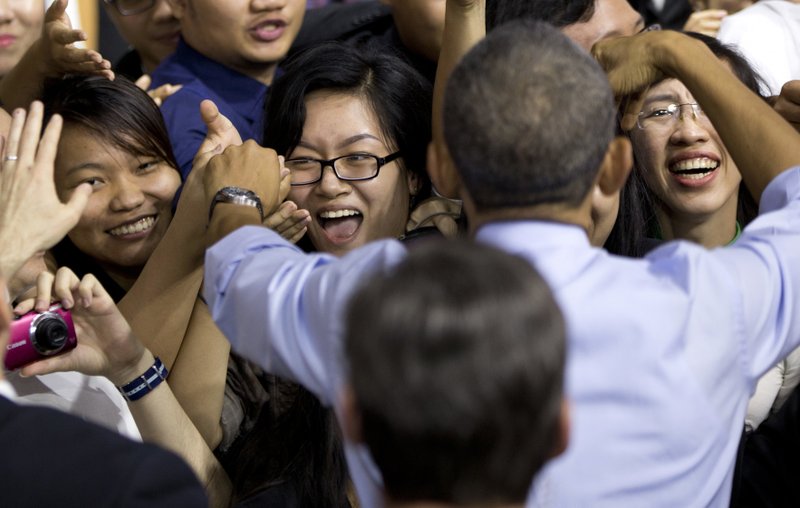SHIMA, Japan -- President Barack Obama said Wednesday that he plans to use his historic visit to Hiroshima with Japanese Prime Minister Shinzo Abe to reflect on the suffering of war and the need to take steps to prevent it.
Obama's opened his trip to Japan with much intrigue about his planned visit to the city where the U.S. dropped the first atomic bomb used in war. But that first-ever visit by a sitting U.S. president was caught up in the news coverage in Japan of the recent arrest of a former Marine in the killing of a Japanese woman in Okinawa.
Abe criticized Obama while demanding the U.S. take steps to prevent crimes by Americans. Obama told Abe that the U.S. would support having the suspect prosecuted in Japan's legal system.
Obama's comments on Hiroshima after meeting with Abe offered a preview of the approach he will try to take at the site of the U.S. attack on Aug. 6, 1945, that killed 140,000 people.
The White House has ruled out an apology by the president for the atomic bombing, but the visit is being viewed by Japanese citizens as a conciliatory gesture.
"One of the things I hope to reflect on when I'm at Hiroshima and certainly something I reflected on when I was in Vietnam was just a reminder that war involves suffering," Obama said after arriving from Vietnam. "We should always do what we can to prevent it."
But he added: "It's important for us to act on occasion in order to make sure that the American people are protected."
Abe said he "wholeheartedly" welcomed Obama's decision, adding that he was convinced that the joint visit would create strong momentum toward global denuclearization.
At the same time, Abe said he had "no specific plans" to visit Pearl Harbor in Hawaii. Some have called for such a trip as a sign of Japan's acknowledgment of its wartime actions.
The surprise attack by the Japanese military on Dec. 7, 1941, killed more than 2,400 people and immediately led to the United States' entry into World War II.
Abe pointed to his previous stop at the World War II memorial in Washington and a speech to a joint session of Congress as acts intended to pay tribute to victims of the war on both sides.
Raw emotions over the U.S. military presence in Okinawa were on display on Obama's first day in Japan, stoked by the arrest of Kenneth Shinzato, 32, in the slaying of 20-year-old Rina Shimabukuro. Shinzato was working as a computer and electrical contractor on Kadena Air Base.
The body of Shimabukuro, who disappeared April 28, was found last week in a forest in the village of Onna, near where Shinzato told police they would find her. She appeared to have been stabbed and strangled, according to lnews reports.
Shinzato, a civilian employee born Kenneth Franklin Gadson, took his wife's name when they got married. He confessed to the crime, domestic news outlets have reported. He has been charged with abandoning a body, a step that is often a precursor to a murder charge in Japan.
The Japanese prime minister said he felt "profound resentment" at the "self-centered and absolutely despicable crime." He said he told Obama that the feelings of the Japanese people must be sincerely taken to heart.
"I have asked the president to carry out effective measures to prevent a recurrence of such crimes," Abe said, a solemn-faced Obama standing beside him.
"I am just speechless," Abe said through a translator.
Obama was contrite.
"I extended my sincerest condolences and deepest regrets," the president said. He said the U.S. would fully cooperate with Japan to allow the suspect to be prosecuted "under the Japanese legal system."
The killing has rekindled long-running opposition from many Okinawa residents who want the U.S. military off the island entirely. Abe suggested that Japan would continue looking for ways to resolve issues that come up under the U.S.-Japan agreement that allows Washington to stage troops there.
Information for this article was contributed by Nancy Benac, Mari Yamaguchi, Darlene Superville and Josh Lederman of The Associated Press and by Anna Fifield of The Washington Post.
A Section on 05/26/2016


